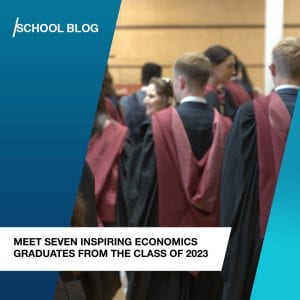 ‘Bristol is one of the best universities in the world, so get there in the right mind and you will have a great path ahead of you.’ Here’s what our recent graduates have to say about their hopes for the future – and their best advice for upcoming students.
‘Bristol is one of the best universities in the world, so get there in the right mind and you will have a great path ahead of you.’ Here’s what our recent graduates have to say about their hopes for the future – and their best advice for upcoming students.
By Ffion Lindsay
What are your stand-out memories from your time at university?
Sam Blundell (BSc Economics with Study Abroad): I don’t know why, but it’s my first year lecture where we were being taught a theory called the market of lemons – and the way our lecturer taught it to us is by throwing lemons through the lecture hall. Every time someone answered a question they’d have to catch a lemon and it was really cheesy but it solidified the teaching in my head. I was really fond of that light-heartedness paired with the rigour of the studies – it was perfect for me.
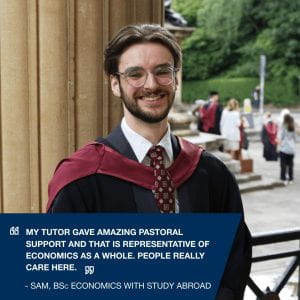
Liepa Macyte (BSc Economics and Econometrics): Definitely meeting everybody on my course and going to society events. Those have been the stand-out memories that I will always cherish for the rest of my life. I’ve had such an amazing time in the city, at the university and with my friends and it’s always going to remain in my mind.
Alicja (BSc Economics): In my applied micro class in second year, I had Professor Sarah Smith and I really wanted to go to her office hours but I was a little shy. When I got around to it all her hours were fully booked and so I sent her an email asking if I could come a bit later after sessions had ended, and she said yes of course. This gave me the opportunity to speak to her for almost an hour, rather than the usual 10-15 minutes, and we got to have so many discussions about different aspects of economics, especially applied micro.
Krishna (BSc Economics): Meeting new friends and international students. If you look at our BSc Economics and other economics cohorts at Bristol, it’s really diverse. So I enjoyed meeting different people a lot. Also Bristol’s courses are known to be among the most mathematical courses you can study in the United Kingdom and having come from a physics, chemistry and maths background in my school in India, I really enjoyed all the modelling and econometrics within it.
What part of your degree did you enjoy or appreciate the most?
Isabel Lavenstein (BSc Economics): I did a data science module in my final year and coming into it I had no experience with coding, which I was quite nervous about. But by the end I felt like I could take on the world with the skills I had learned!
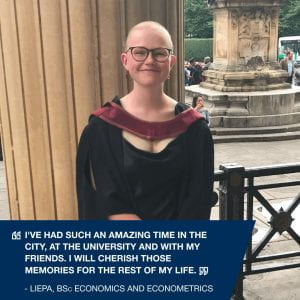
Alexander (BSc Economics and Mathematics): I like microeconomics as I enjoy how much maths there is. The more technical aspects are the most interesting to me. Dr Stefan Hubner really helped me – he’s the best really. He convinced me to apply to some Master’s courses at Oxford and UCL and aim higher than I had been, and I got into Oxford.
Madeline (BSc Economics): Bristol has been a really nice balance between studies and social activities and sports and that side of things. My favourite module was applied microeconomics. It was fabulously taught by Professor Sarah Smith and Dr Peter Spittal and it really helped me decide what I wanted to do in the future.
![A smiling photo of Isabel Lavenstein with text overlaid that reads 'I did a data science module [with] no experience of coding, which I was quite nervous about. By the end I felt like I could take on the world with the skills that I had learned!'](https://economics.blogs.bristol.ac.uk/files/2023/08/Isabel-Insta-Grid-v2-300x300.jpg)
Liepa: I was in FilmSoc and that was a brilliant experience – just joining societies and getting to know everybody was amazing. And I love Bristol as a city – it’s so vibrant and youthful. It’s still a big city without the scary feeling of London.
Alicja: I would say the office hours, seminars and tutorial groups as it’s more intimate when there are just ten students with the professor. In the actual office hours, that’s the time when you can actually get to know the professors and see their passion for their subject shine.
Sam: I got amazing support from my tutor for my dissertation, Dr Sara Navid. She was fantastic, giving me the academic support without pushing me in any particular direction, allowing me to make my own decisions and get to where I wanted to go. She also gave amazing pastoral support and that is representative of economics as a whole. People really care here.
What advice would you give to a student just starting out?
Isabel: Embrace the opportunity you have to study so many different types of economics. Find out what you enjoy and go for that.
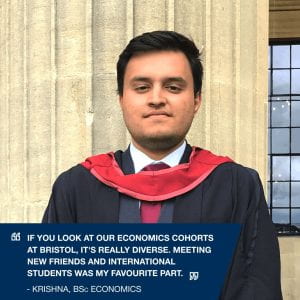
Alexander: If you want to do well, you do need to work hard! But try to enjoy yourself too, get out there and make friends and have a good time.
Sam: I think open-mindedness is crucial. A lot of people studying economics go into their course with a very specific goal in mind – to get into finance or to get a specific qualification – and that what I did. I wanted to get into finance and I found through the course of my degree that it wasn’t right for me. So you should go into university with an open mind about what courses you take and societies you get into. Don’t pigeonhole yourself too early, allow yourself to grow and find where you belong.
Liepa: Just enjoy everything! Try out every society you can think of and make the most of your time here at Bristol. Don’t be scared of trying anything new.
![A smiling photo of Alicja overlaid with the text 'My favourite part of my studies were the office hours[...], you can actually get to know the professors and see their passion for their subject shine.'](https://economics.blogs.bristol.ac.uk/files/2023/08/Alicija-Insta-Gridv2-2-300x300.jpg)
Krishna: You are coming to a great uni that has a lot of great connections. Just make sure that you leverage those connections and enjoy what you do. Economics especially is a subject where you really need to be interested in what you’re doing, because if you’re not you can’t make the best out of it. Bristol has a lot of resources and it’s one of the best universities in the world, so get there in the right mind and you will have a great path ahead of you.
Alicja: Go to office hours a lot – in the beginning I was always a bit afraid to got to those because I thought ‘the prof is going to think I’m stupid’, but that’s definitely not the case. You get much deeper insights and advice and actually form bonds with your professors that way.
Madeline: Try everything – as soon as you get optional modules, try things that are outside of your comfort zone and not just what your friends are doing. You’ll get to see if there’s anything niche that really takes your fancy. I never thought applied microeconomics would be my area of interest but in trying it I realised I really liked it.
What are you plans for the future?
Isabel: My plan is to continue on to Master’s study at UCL in Economics. I’m really passionate about economics and I think that this degree has really shown me what I care about, which is public economics. So I’d love to work for the Government Economic Service doing public policy work, or for a thinktank.
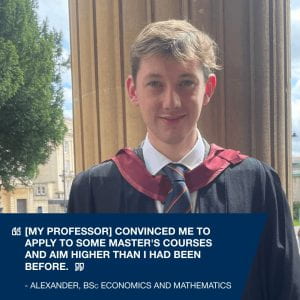
Alexander: I’m going to be doing a Master’s in economics at the University of Oxford. I’m not sure what I’ll do after, but it’s going to be maths- or economics-related. I haven’t worked out if I want to work for the government yet. But my girlfriend will be a doctor hopefully, so I might not have to do too much!
Sam: I don’t have further study lined up but doing well in my dissertation is making me seriously consider it. I really enjoyed economics and I think I’d miss it if I went without it for too long! The most rewarding parts of my degree were the topics where I could apply the theory to policy – like minimum wage, healthcare – tackling issues from an economics perspective. Any role that’s to do with policy or government appeals to me.
Liepa: I’m taking out a gap year because of cancer. I had to miss my last exam to be able to start treatment, then I found out during results day that I had been given the credits required to graduate and therefore will be graduating. So after treatment I’ll continue with my education and do a Master’s degree in econometrics.
![A smiling photo of Madeline overlaid with the text 'My favourite module was applied microeconomics[...], it was fabulously taught and really helped me decide what I wanted to do in the future.'](https://economics.blogs.bristol.ac.uk/files/2023/08/Madeline-Insta-Grid-v2-300x300.jpg)
Krishna: I am planning on applying for a Master’s in financial economics in the States so I’m going to take a year to do my GRE examination and then start my application to Columbia and MIT. I think Bristol’s courses will enable me to be eligible at a good level for those sorts of universities. All of my professors have been very open to helping me and gave me the names of professors at these universities who specialise in econometrics, something that I really loved during my studies. After that, I want to go down the investment banking route and I’ll probably end up at a trading desk or something like that.
Madeline: I am going to be starting a Master’s course in economics at the University of Cambridge. I had a few professors at Bristol who gave me guidance on how to apply for Master’s courses and how to write a personal statement. They gave me lots of valuable feedback – it was really helpful. From my studies at Bristol, I know that I love environmental economics and then I’m also interested in public economics. I’m doing my Master’s to upskill myself so I can apply to international organisations like the UN. That would be my dream.
Alicja: In September, I’m starting a Master’s in economics at the London School of Economics. I went to five of my professors at Bristol and they all helped me with my personal statement and what to put in my application and my CV. They showed me how to focus on my strengths and really emphasise them in my application. My long-term hopes are to stay in economics, maybe do a PhD or pursue a pre-doc, but to use the econometrics skills I’ve learned to find causality and patterns and understand how the world really works.
Congratulations to all our graduating students. Please stay in touch to let us know about your future successes at alumni@bristol.ac.uk.

